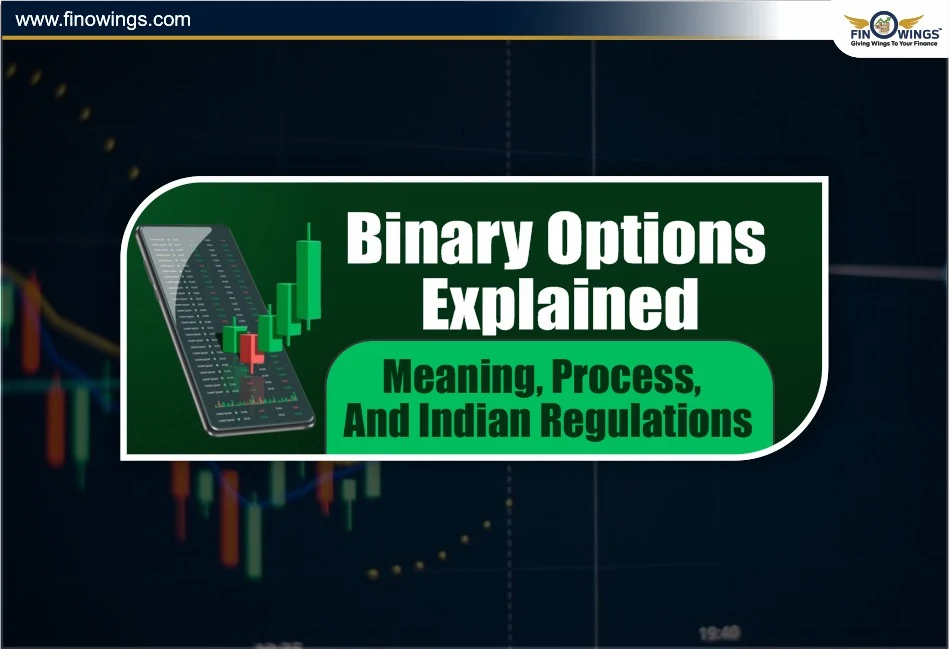Home >> Blog >> Binary Options Explained: Meaning, Process, and Indian Regulations
Binary Options Explained: Meaning, Process, and Indian Regulations

Table of Contents
Investing in world markets has become very lucrative compared to in the past. Among various trading instruments, binary options are among the most commercially available and simple to use. Recently, however, they have attracted criticism and legal restrictions owing to their real risks.
In the following sections, we will cover the meaning of binary options, the concept of binary trading, the method of binary trading, and finally, we will address the legality of binary trading in India.
What is Binary Trading?
In simple terms, a binary option is a trade agreement with a return of either a fixed monetary amount or nothing. In other words, there are only two potential outcomes: either a profit or a loss. You can predict the price trend of a specific item (stock, commodity, currency pair, or index) over a predetermined time period by using binary options.
You are entitled to a profit if you are correct; you forfeit your stake if you are incorrect.
Example:
If you predict that the price of gold will exceed Rs. 60,000 in an hour, you are making a bullish prediction.
If gold's price is above Rs. 60,000 at the end of the trading period, you "win" and get back a part of your stake (generally around 80-90%). If gold closes below Rs. 60,000, you "lose" and get nothing back.
This is why many traders call it "all or nothing" trading.
Meaning & Concept of Binary Trading or What are Binary Options?
The meaning of binary trading is derived from its simplicity and time-oriented speculation. Traders do not actually buy or sell an asset - they speculate on price movement of an asset (within 30 seconds and several hours). Most binary trading platforms provide different classes of assets to trade, such as-
Stocks such as Reliance Industries, Forex pairs (e.g. USD/INR), Commodities (e.g. Gold, Silver), Indices (e.g. Nifty 50, S&P 500)
The trader determines:
-
Which asset to trade
-
Time duration (expiry)
-
Call (Up) or Put (Down)
This is what makes binary trading options attractive for beginners. It is also highly risky as it is based on short-term price movements and volatility.
What Is Binary Option Trading Process?
For a more clear understanding, let’s take a look at what is binary option trading in a practical way through simplified steps.
-
Choose an Asset- In binary options, you choose a financial instrument to trade such as a currency pair, stock or commodity.
-
Predict Price Direction- Decide whether to choose a “Call” option for a price increase or a “Put” option for a counteract (decrease) price movement for the selected time.
-
Select Time Frame- You will need to select a time frame for the trade to expire 30 seconds to a maximum of 1 day.
-
Set Investment Amount- Decide how much you are willing to invest in binary options. The platforms usually allow small minimum investments.
-
Place Trade & Wait for Expiry- When you place a trade, all you need to do is wait for the trade's expiration time.
-
Outcome- If you make the correct prediction → you will receive a fixed price payout (e.g 80%).
If you make an incorrect prediction → you lose the invested amount.
Example:
You predict that the crude oil price will increase for 15 minutes and place a bet of Rs. 1,000. If the prediction is correct, the payout will be Rs. 1,800 (Rs. 1,000 + Rs. 800 profit). If the crude oil price prediction is wrong, you will lose Rs. 1,000.
Benefits of Binary Options
1. Understanding the Basics: It is essential and does not require extensive market experience.
2. Knowing the Stakes: You can pre-determine the potential profit and loss.
3. Quick Returns: You can get an outcome in minutes.
4. Low Initial Investment: Most services offer trade opportunities for a nominal fee.
These benefits still require consideration of the significant legal issues which we will discuss next.
Problems and Consequences
-
The negative outcomes of the various options available can lead to loss of funds.
-
Rapidly changing scenarios can lead to unsound decisions.
-
Some platforms for binary trading in options are not licensed and may be criminal.
-
Options traders are not acquiring the assets in question and are speculating.
Due to these issues, several nations in the world, including India, have made these activities illegal.
Is Binary Trading Legal in India?
Many investors ask Is binary trading legal in India? The simple answer is no. Binary options trading is illegal in India. Every financial trading practice is regulated by the Reserve Bank of India and the SEBI. Currently, SEBI does not license any broker or exchange to conduct binary options trading.
Why is it Illegal?
-
Binary trading is more like gambling than any other type of investment.
-
Numerous global platforms are unscrupulous, and there are many scams directed to Indian traders.
-
Delinquent platforms have little to no regulation, meaning prices and payouts are sophisticatedly manipulated.
-
Engaging in binary trading on foreign platforms will involve illegal forex transfers as per the FEMA (Foreign Exchange Management Act).
SEBI’s Stance:
SEBI, at all times, warns retail investors about the risk of offshore binary trading websites. They should only trade with derivatives, mutual funds, or equity and refrain from dealing with SPBI-registered brokers.
Legal Alternatives in India
Investors in India can engage in legal trading through:
-
NSE/BSE equity and derivatives markets
-
Futures in currency and commodities (through SEBI-registered brokers)
-
Invest in mutual funds and exchange-traded funds (ETFs).
Binary Options vs Traditional Trading
|
Aspect |
Binary Options |
Stock/Derivative Trading |
|
Ownership |
No ownership of the asset |
Ownership or derivative contract |
|
Duration |
A few seconds to hours |
Days to months |
|
Risk |
Fixed - all or nothing |
Variable, can hedge |
|
Legality in India |
Not legal |
Fully regulated under SEBI |
|
Payout |
Fixed |
Depends on market movement |
The provided analysis outlines differences within trading markets, offering insight on why investing in only regulated markets is recommended: higher transparency and legal frameworks put in place to protect investors.
To learn how automated trading operates within SEBI's framework, traders who wish to shift away from speculative methods like binary trading and toward regulated, methodical approaches may consult our tutorial on Algo Trading: How It Works, Strategies for It, and Automated Trading.
Conclusion
While placing binary options may seem simple, it is legally prohibited within India’s market and carries extremely high risks. Steer clear of fake websites and focus on regulated trading alternatives. Commodities, equities, ETFs, and mutual funds are safer options because SEBI has approved their trading. Binary options trading's ease of use does not reduce the risks.
Understanding the meaning of binary trading and its legal context can enable you to make more secure, intelligent, and compliant choices when investing. In trading, the excitement of the moment is not as important as having knowledge and adhering to regulations.

















